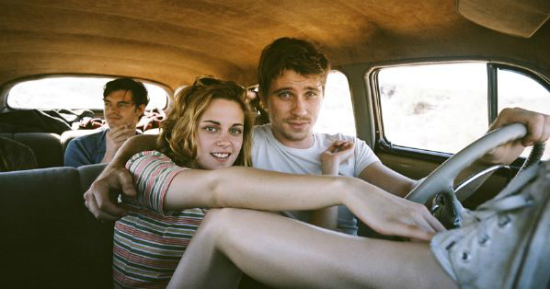
"Road movies" may be associated primarily with American film -- from The Grapes of Wrath to Easy Rider -- but the Brazilian director Walter Salles is growing into a master of the genre. In films like Central Station (1989), The Motorcycle Diaries (2004) and now On the Road, he poetically portrays characters in the process of self-discovery as they move through evocative landscapes. Indeed, one of the most anticipated titles at this year's Cannes Film Festival has been On the Road, based on the groundbreaking book of 1957 by Jack Kerouac that became a classic of the "Beat Generation." It received an enthusiastic reception Wednesday night.
During an interview at the Cannes Film Festival, Salles talked to me about the movie's long gestation process: "I first read the book when I was 18," he recalled. "We were undergoing the effects of the military dictatorship of the mid-1970s in Brazil. The inherent freedom of the book's characters, the way that they took those journeys in search of themselves -- of the last American frontier, and of themselves -- and the way they explored sex or drugs as instruments to expand their understanding of the world, these were the exact reverse angle of what we were allowed to live in Brazil at that time."
Much like his young Che Guevara protagonist in The Motorcycle Diaries (played by Gael Garcia Bernal), the characters based on Kerouac, Neal Cassady, and Allen Ginsberg are not yet icons: "They have more doubts than certitudes," Salles said. "They are searching, experimenting, to find a critical conscience, which will lead to a voice. From 1946 - 51, you have the first stammers to articulate that voice. On the Road precedes the birth of the Beat Generation."
Kerouac, famous for typing on a continuous roll of taped-together paper rather than individual pages, hit the road himself from the late 1940s through the '50s, and used the journeys as raw material for his cross-country novel. The names were changed: he became Sal Paradise (who is played by Sam Riley); Neil Cassady was called Dean Moriarty (Garrett Hedlund in the film), and Cassady's wife LuAnne -- who married him at the age of 15 -- became Marylou.
 Photo Credit: Gregory Smith
Photo Credit: Gregory Smith
She is played with a sweet sexiness by Kristen Stewart, who continues to impress -- even beyond the blockbuster Twilight series -- in films such as Into the Wild and The Yellow Handkerchief. At a party (in Le Baron nightclub, which is part of the Cannes Casino) after the screening, she said that working with Salles was "amazing." When I asked about the pulsating scene of her dancing wildly with Dean, she called it "intense" because -- even though there were only four takes -- "we had to do the entire dance each time."
Intensity characterizes every step of the process that led to On the Road. Salles acknowledged in Cannes that he felt unprepared to take on the challenge of this inherently American fiction film when it was offered to him in 2004 by American Zoetrope. (Executive producer Francis Ford Coppola had been developing the project since 1978. Among the actors whose names were announced over the years are Marlon Brando, Johnny Depp and Brad Pitt.)
Salles therefore proposed making a documentary first, entitled Searching for On the Road, and he then created a "Beatnik Boot Camp" for his actors and crew. "I retraced for several years the journeys described in the book, to meet the characters who were still alive, and to talk to the poets of this generation who have a point in common," he said in fluent English. (Salles is a polyglot who speaks perfect French and Spanish in addition to Portuguese.)
Viewers of On the Road may take freedom for granted, but he stressed the stifling climate of the early 1950s: "These were the McCarthy years: the culture of fear was starting to spread. To strive for a different future at this time was extremely difficult." The very form of Kerouac's book is impressionistic rather than classically constructed, which fed into the structure of the adaptation. Salles' screenwriter is once again Jose Rivera, who was nominated for an Oscar for his Motorcycle Diaries script.
The director evocatively described Kerouac's black manual typewriter as "an extension of his own body, like a jazz instrument would be the extension of a sax player. This explains the jazz-infused melody in the book -- and the culture of the spontaneous in the book -- all linked to his profound interest in jazz as a unique art form that he discovered in 1941. He somehow anticipated how it would inform different types of artistic domains that would come a bit later, like the paintings of Jackson Pollock, the Living Theater, the new journalism of the Village Voice, Jules Feiffer's comic strips, or the stand-up comedy of Lenny Bruce."
The film's introspective Sal and boisterous Dean seem to need wheels, weed and women (in that order). While they may strike some viewers as self-indulgent, irresponsible hedonists, Salles stressed their poignancy as well: "Yes, it's sex, drugs and be-bop, but also the pain that comes with broken friendships, lost fathers, and the incapacity to be fathers themselves. There's a gravity to the book that you don't catch the first time. We tried to infuse the film with this abandonment, loss, and pain."
Annette Insdorf, Director of Undergraduate Film Studies at Columbia University, is the author of PHILIP KAUFMAN.
